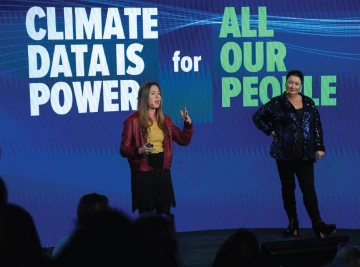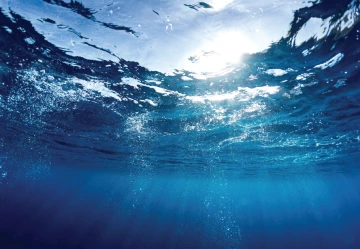
Joellen Russell and Beth Tellman at SXSW
Joe C. Klug
University of Arizona climate scientists Joellen Russell and Beth Tellman are self-described “climate moms” – mothers gathering and using climate data to inform decision making today and preserve a better world for their kids and all future generations.
As mothers who also happen to be climate scientists, they study the Earth and human impact on its ecosystems. Dedicated to preserving the planet for the future, they know that to solve the problem of climate change, science must be demystified and everyday people around the world must demand solutions that preserve the planet for all our kids.
“Why do we do it?” asks Russell. “We’re moms – this is what we do. We want our little ones to have the safe, secure, prosperous future that they deserve and that we grew up with.”
Research by Tellman, assistant professor in the College of Social and Behavioral Sciences, is saving lives and helping to protect economies by revealing how global warming is dramatically increasing flooding. Using satellites, she captures data from flood events around the world and uses machine learning to not only reconstruct past incidents, but also develop algorithms that predict flooding and its destruction with increasing accuracy.
Since flooding sets back progress in many developing countries, the research has far-reaching social and economic value. She recently produced a 20-year history of flooding in Bangladesh and trained local stakeholders to use her algorithms to create their own flood maps.

Better flood data can also help with kitchen-table economics, potentially reigning in insurance costs and helping families get financial support. A new collaboration using Tellman’s flood maps is helping households prove flood damage to secure FEMA disaster aid.
Research by Russell, a professor in the College of Science, also spans the world, expanding our understanding of the relationship between global warming and our oceans, which both store and release the greenhouse gas carbon dioxide (CO2).
Since 2014, Russell and her team have been building the world’s largest dataset on conditions of the Southern Ocean, using sensor-laden robots that float more than half a mile below the frigid water’s surface.
Her studies show that increasingly intense westerly winds – belts of winds that are key to large-scale weather patterns in both the northern and southern hemispheres – are driving a massive outgassing of carbon dioxide from deep ocean waters that have held it for nearly a millennium.
That additional CO2 in the atmosphere increases atmospheric warming, which further intensifies wind in a vicious cycle with dangerous effects on global weather systems.
